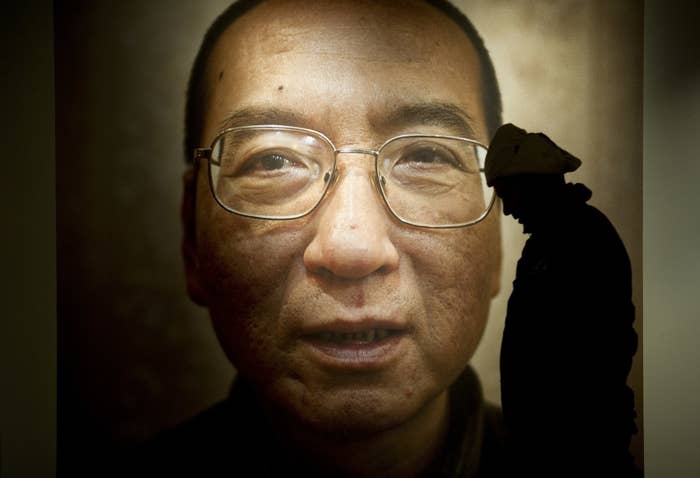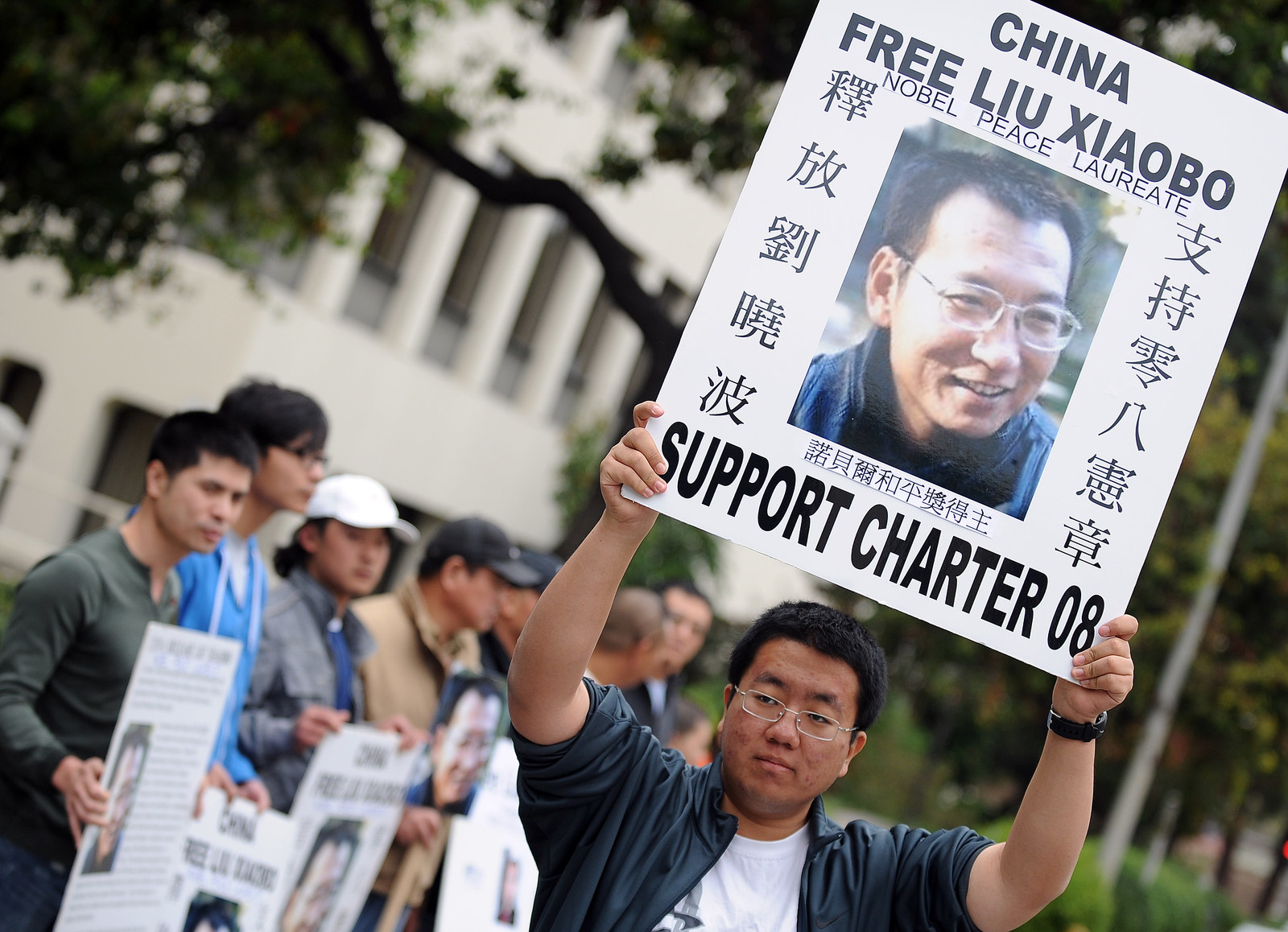
BEIJING — Liu Xiaobo, the Nobel Peace Prize-winning activist and writer who spent decades fighting one-party rule and working to bring democracy to China — only to spend years behind bars for his efforts — has died. He was 61.
Liu died from multiple organ failure on Thursday, local officials in the northeastern city of Shenyang said in a statement.
Imprisoned since 2008 for “inciting subversion of state power," Chinese authorities granted Liu medical parole in June so he could receive treatment for late-stage liver cancer. Amid widespread international criticism of the government's refusal to allow Liu to travel abroad for treatment, his doctors in China had said in a statement on June 10 that he was in a critical condition.
"Today we grieve the loss of a giant of human rights," Amnesty International Secretary General Salil Shetty said in a statement. "Liu Xiaobo was a man of fierce intellect, principle, wit, and above all humanity."
While in prison in 2010, Liu was awarded the Nobel Peace Prize in absentia "for his long and non-violent struggle for fundamental human rights in China," becoming the first and only Chinese national to win the prestigious award. Because the government did not allow him to travel to Norway for the ceremony, an empty chair stood in for him on stage.
A writer and intellectual, Liu was at the forefront of pro-democracy movements in China for decades. From the Tiananmen Square protests in 1989 to the Charter 08 movement in 2008, he spent his career stubbornly pushing for reforms in his home country, even as the ruling Communist Party grew increasingly hostile to campaigners like him.
The White House said President Donald Trump was "deeply saddened" to learn of Liu's passing. "A poet, scholar, and courageous advocate, Liu Xiaobo dedicated his life to the pursuit of democracy and liberty," press secretary Sean Spicer said in a statement.
"Mr. Liu dedicated his life to the betterment of his country and humankind, and to the pursuit of justice and liberty," US Secretary of State Rex Tillerson said in a statement.
Though he is not well known in his home country, where authorities heavily censored mentions of his name and activities in both the state press and online, Liu influenced a generation of Chinese advocates for human rights, democracy, and rule of law.
"I think he's an iconic figure, and although we didn't always agree on everything, I hold the deepest respect for him," Mo Shaoping, Liu's lawyer who has known him for decades, told BuzzFeed News. "In my eyes, there's no one who surpassed his influence."
Liu came of age as an intellectual and activist in the 1980s, at a time of great optimism for human rights and democratic reforms in China amid the rise of pro-democracy movements in Eastern Europe.
A generation later, those hopes have largely been dashed. Things have gotten far worse for rights campaigners of all kinds under President Xi Jinping, whose government has jailed scores of activists, from independent lawyers to feminist protesters.
"In a wider sense, the story of Liu Xiaobo is a story of a generation of Chinese activists," Maya Wang, a China researcher at Human Rights Watch, told BuzzFeed News. "The fact that there is a tragic outcome at the end is symptomatic of China as a whole."

After establishing himself as a prominent university professor in the mid-1980s, Liu was on a Western speaking tour in 1989 when students in Beijing began to protest for democracy. He immediately returned to the Chinese capital.
As he advised the young demonstrators in Tiananmen Square, Liu himself took part in a weeklong hunger strike. When martial law was declared, he negotiated with officials so that protesters could leave the square — a move credited with saving hundreds of lives.
After the Chinese military gunned down hundreds of unarmed students near the square, Liu was among those rounded up and jailed for two years. He later described his Tiananmen experience as "the major turning point" in his life.
Turning down an offer of asylum from Australia, Liu opted to remain in China, where he continued to criticize the Communist Party and called for his fellow Tiananmen protesters to be released. For this he was jailed again in 1996, spending three years in a hard-labor camp.
In 2008 Liu and other intellectuals began drafting Charter 08, a scathing, 19-point document outlining democratic reforms needed in China. It blasted "the ruling elite" for continuing "to cling to its authoritarian power," and for fighting off "any move toward political change."
Charter 08, which has since gained thousands of supporters, painted a grim picture of China under Communist Party rule: a nation of corruption, crony capitalism, inequality, and environmental degradation.
"This is a historic moment for China, and our future hangs in the balance," read Charter 08, which was signed by more than 300 intellectuals.
Two days before the document was set to be released online, Chinese police swooped on Liu's home, arresting him and holding him in detention for a year. He was subsequently sentenced to 11 years in jail.
His wife, Liu Xia, herself a poet and intellectual, was also placed under house arrest, but has never been charged with any crime. She often spoke out on behalf of her husband's case, and the two swapped love letters and poems during Liu Xiaobo's time in prison.
"I am a hard stone in the wilderness, putting up with the pummeling of raging storms, and too cold for anyone to dare touch," Liu wrote in a 2009 love letter to his wife. "But my love is hard, sharp, and can penetrate any obstacles. Even if I am crushed into powder, I will embrace you with the ashes."

When Liu was awarded the peace prize in 2010, US President Barack Obama, himself a Nobel laureate, praised the Norwegian academy's decision to honor the dissident, and called on Beijing to release him.
"The Nobel Committee has chosen someone who has been an eloquent and courageous spokesman for the advance of universal values through peaceful and non-violent means, including his support for democracy, human rights, and the rule of law," Obama said in praise of Liu.
Secretary Tillerson said Liu embodied "the human spirit" of the prestigious award. "In his death, he has only reaffirmed the Nobel Committee’s selection," he said, calling on Chinese authorities to release Liu Xia.
In China's current political environment, pro-democracy campaigners as vocal and high-profile as Liu are rare, and younger activists are more likely to try to work within the system rather than push for fundamental changes in their government.
Despite his treatment by Chinese authorities, Liu claimed to hold no hatred in his heart.
"None of the police who monitored, arrested, and interrogated me, none of the prosecutors who indicted me, and none of the judges who judged me are my enemies," he said in a statement to a Chinese court in 2009, which was was read again by actor Liv Ullmann at the 2010 Nobel ceremony.
"I firmly believe that China's political progress will not stop, and I, filled with optimism, look forward to the advent of a future free China," he said. "For there is no force that can put an end to the human quest for freedom, and China will in the end become a nation ruled by law, where human rights reign supreme."
David Mack reported from New York City. Megha Rajagopalan reported from Beijing.


